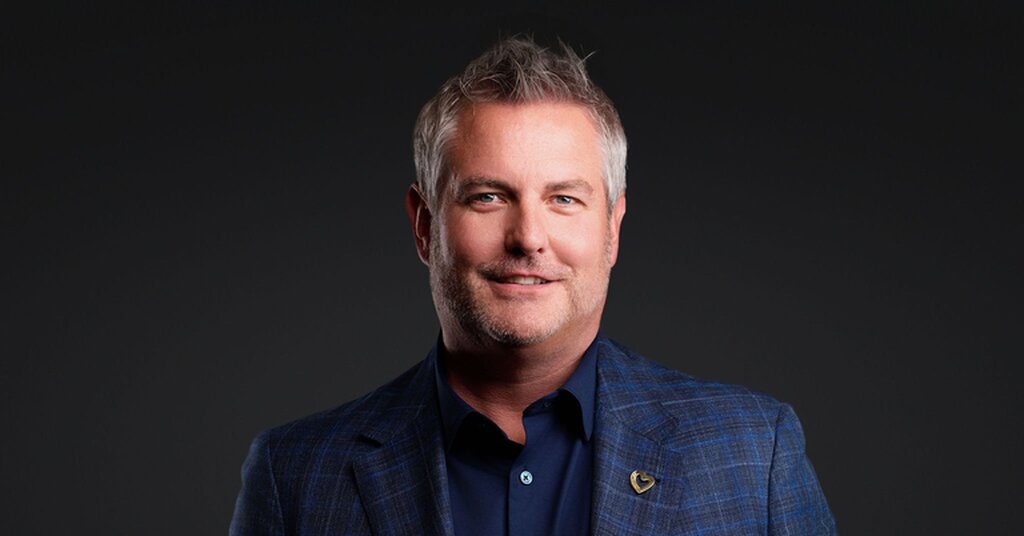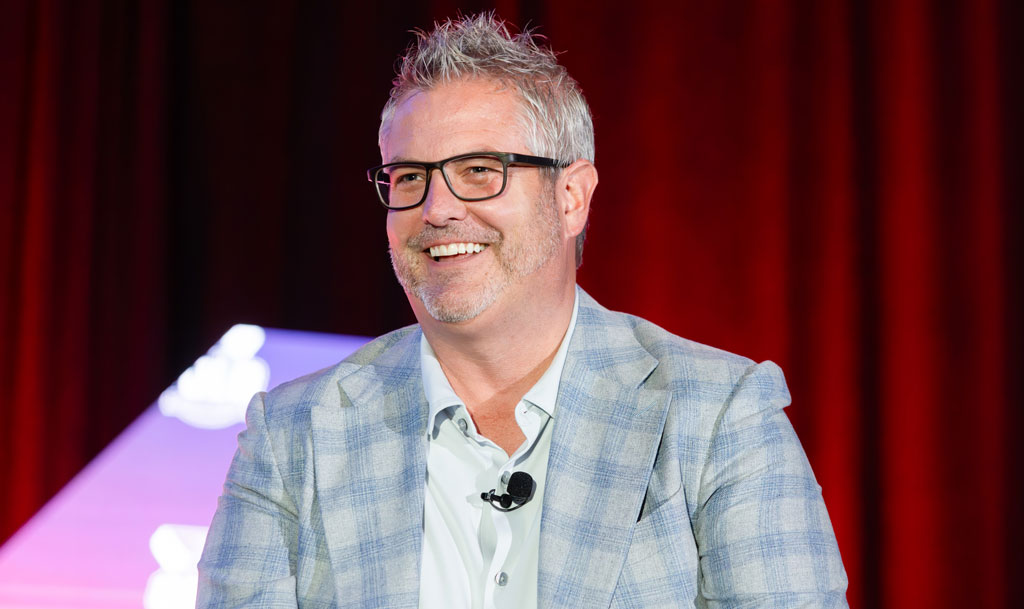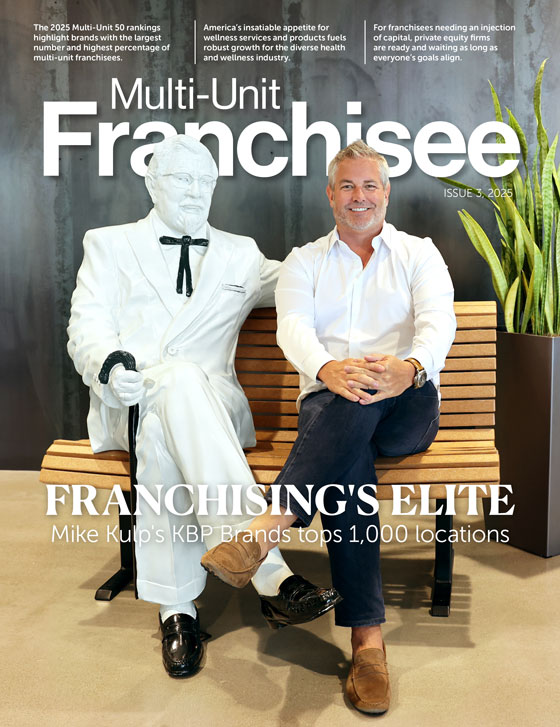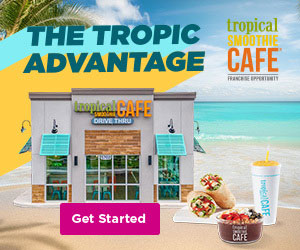The $1 Billion Man: KBP Brands tops 1,000-plus locations

Name: Mike Kulp
Title: CEO
Company: KBP Brands
No. of units: 828 KFC, 119 Arby’s, 85 Sonic, 56 Taco Bell
Family: Wife Stephanie and 3 children, Eric, 24, Mikey, 17, and Gracie, 13,
Years in franchising: 26
Years in current position: 14
When Multi-Unit Franchisee magazine first profiled Mike Kulp in February 2019, he was riding high, leading one of the nation’s fastest-growing restaurant companies with more than 700 KFC and Taco Bell locations under his belt. Business was booming, and the future looked bright.
Just a year later, the Covid-19 pandemic swept across the country, bringing everyday life and the restaurant industry to a halt. As dining rooms closed and uncertainty loomed, the challenges piled on. Even as the pandemic’s grip loosened and restaurants reopened, operators were hit with a new wave of hurdles: labor shortages, rising wages, and surging inflation that sent product costs soaring. Through it all, Kulp remained steady. He says the storm tested his team and made them stronger, more focused, and better equipped for whatever comes next.
“We learned to be nimble and how much the team can handle,” Kulp says. “It was a period of tremendous stress. It went from being a very negative situation to one with a lot of positive outcomes. It taught us we can handle a lot, and it made us better in areas outside of dealing with the pandemic.”
KBP Brands is coming off its second-largest growth year by revenue and the largest EBIDTA acquisition year in its 14-year history. The company has also grown to more than 1,000 locations and extended its portfolio beyond the Yum! Brands family to include Inspire Brands by purchasing 119 Arby’s and 85 Sonic restaurants. Diversifying KBP’s portfolio was a strategic move to reduce risk, increase the customer base, and add value to the company.
“Financial markets value diversification,” Kulp says. “It is less risky. There are price fluctuations in products like chicken or beef. Those businesses are very different from each other. This has given us the ability to work with two world-class franchisors with a great history and a bright future.”
Despite owning one of the country’s largest restaurant companies with locations in 32 states, Kulp keeps the focus of his business on the people who operate it each day. He considers hiring the right employees to be his best investment. While Kulp oversees the financial performance of his restaurants with a keen eye, he says it is important to bring in talented managers and team members and give them the space to run daily operations.
Kulp puts those thoughts into action with the company’s equity partner program, in which top employees can buy into the business and have a stake in the company. What began with two team members 15 years ago has expanded to approximately 50 employees with ownership stakes. He said that the program helps recruit top talent and keeps turnover for key positions low.
Even though KBP has surpassed 1,000 units with an annual revenue of $1.4 billion, Kulp plans to continue scaling the business. Rather than reaching a certain number of units or brands, he considers his primary goal to create opportunities for KBP Brands employees to grow personally, professionally, and financially each year.
PERSONAL
First job: As a cook at the local drive-in restaurant. I started on the day I turned 14.
Formative influences/events: There have been many. I’ve found people to be incredibly generous with their time and patience and am forever grateful to the many people who have said “yes” to teaching and helping me over the years. Dave Goebel, former CEO of Applebee’s and several other brands, has been a wonderful resource and very helpful to me and my team. Jim Schwartz was another large, multi-unit franchisee on a similar career path years ago, and I was able to communicate and exchange ideas with him.
Key accomplishments: Creating our internal equity program years ago, building our employee-focused charity, KBP Cares, in 2015, and recapitalizing the business several times.
Biggest current challenge: It’s been a tough few years in the restaurant industry following the pandemic. Costs have increased, and consumer headwinds have been real. Keeping teams highly motivated, focused, and striving for greatness in these types of environments is always a challenge.
Next big goal: Through continued diversification to position the organization for another decade of profitable growth. We want to provide a path to see tangible growth opportunities on a consistent basis.
First turning point in your career: Raising enough capital to buy out my existing partners in 2011 to create KBP as we know it today.
Best business decision: Making key employees equity partners. Providing ownership in the company has helped us attract and retain top talent. It’s motivating to have a vested interest in the company’s success and has been incredibly rewarding over the years for our partners.
Hardest lesson learned: We had a perfect storm following the Covid pandemic, when labor, inflation, and the cost of products increased by more than 40% over a two-year period. The scale and pace of that inflation was so rapid that we couldn’t have planned for it, but the experience reinforced the importance of diversification and maintaining flexibility with our capital partners, our teams, and our brands. Hard lessons are part of taking risks. What we’ve learned from them has been invaluable.
Work week: I have significant diversity in my day with my team, our investors, our franchisors, and other franchisees. The diversity is what keeps it interesting. There are periods within the year that I spend a significant amount of time on the road and others where my days are more consistent in our corporate office in Kansas City. This industry keeps you on your toes, and you never know what tomorrow may bring.
Exercise/workout: It varies greatly depending on my location and what I have going on at that given time.
Best advice you ever got: To find the smartest, best mentors who you’d never think would take time out of their day to talk with you. In fact, I’ve yet to have someone tell me “no,” and I have asked some pretty accomplished leaders for their time.
What’s your passion in business? Our purpose is to create life-changing opportunities. It’s rewarding to see the number of people who have accomplished amazing things personally, professionally, and financially through KBP.
How do you balance life and work? This comes down to prioritization in both life and work. A valuable lesson I learned early on: “If someone else can be doing it, they should be.” This helps prioritize your time and avoid spending it on things you simply don’t need to do.
Guilty pleasure: A great bourbon and new golf equipment.
Favorite book: I only read nonfiction and business books. I couldn’t pick just one. There are so many great takeaways from people’s real experiences.
Favorite movie: Too hard to choose; it depends on my mood.
What do most people not know about you? I still want to learn to speak Spanish fluently and learn to play the piano.
Pet peeves: Clutter, disorganization, and arrogance.
What did you want to be when you grew up? A lawyer. Thank goodness that didn’t work out!
Last vacation: Grand Cayman in May.
Person you’d most like to have lunch with: My late father, who passed away at a young age.

MANAGEMENT
Business philosophy: We’re here to help people. What you put into people comes back around. KBP’s culture is competitive and compassionate. We’ve got to push each other and take care of each other.
Management method or style: Hire smart people who challenge you, whom you enjoy being around, and whom you want to wake up every day to deliver for.
Greatest challenge: Constantly enhancing talent and increasing our capabilities to scale the business without losing sight of the nimbleness and connectedness we had when we were much smaller.
How do others describe you? Strategic, optimistic, cares about people and culture, loyal, and genuine. People know I don’t care about personal success as much as the success of the people around me and this thing we’re building together.
Have you ever been in a mentor-mentee relationship? What did you learn? I am always in both and have learned far more than I could begin to list here. I am a huge believer in continuously learning from those who have been where you are and where you want to go.
One thing you’re looking to do better: I’m always looking to do everything better. One of our core values at KBP is “Fight for Great,” which is about how we constantly learn and evolve to push the business forward, drive growth personally and professionally, and never settle for mediocrity.
How you give your team room to innovate and experiment: I think it’s important to give people room to make mistakes and learn from them. It’s how we get the best creative thinking and build resilience. Storytelling about mistakes we’ve made and public displays of imperfection are critical in creating this environment.
How close are you to operations? I got my start in operations but learned early on the importance of hiring great people and letting them run. We have phenomenal operations experience leading each of our brands, including leaders in each of our markets who work closely with restaurants every day to push for consistency and improvement. I stay close through the numbers but allow the team their space.
What are the two most important things you rely on from your franchisor? Creating and upholding a strong brand and thought leadership. We also expect our franchisors to hire top-level talent and attract top-level franchisees.
What you need from vendors: Consistency. We also want them to view our relationship as a partnership.
Have you changed your marketing strategy in response to the economy? How? Yes. I think every brand has. Lower consumer demand and inflation always lead to higher competition for share. We’ve made strategic shifts on spending, placement, messaging, and more. We have also had to make significant shifts in marketing due to the rapidly changing role nontraditional media plays today.
How is social media affecting your business? Social media helps us reach audiences, such as customers and potential employees, who would otherwise be difficult to reach. But it is also a platform that thrives on negativity, and one bad customer experience that goes viral can damage a brand and its employees. It’s a blessing and a curse, and handling both of those is a delicate balance.
In what ways are you using technology (like AI) to manage your business? We are using it for hiring, and we are testing it with drive-thru ordering at some of our locations. There are opportunities to start integration into our HR tools.
How do you hire and fire? It is a balance between hiring people who have all the capabilities that you need and working with people you enjoy being with.
How do you train and retain? To me, all things start with relationships, and nothing builds morale faster than servant leadership.
How do you deal with problem employees? How we lead our teams has more impact on our success than anything else. We coach and deal with issues quickly and never underestimate the impact that a poorly performing or highly negative employee can have on the team. Helping someone find a better fit is often the best thing you can do for everyone.
Fastest way into your doghouse: Any breach of trust or integrity.
BOTTOM LINE
Annual revenue: $1.4 billion in 2024.
Goals over the next year: Continued growth and diversification. We want to scale the brands that are newer to our portfolio.
Growth meter: How do you measure your growth? We’re an acquisition-driven business, but for us, it’s not about reaching a specific number of brands or locations. We’re always looking for opportunities because growing the business also means helping our employees grow personally, professionally, and financially.
Vision meter: Where do you want to be in five years? 10 years? We’ll continue doing the things that are working and evolving where we’re headed, but everything we do is measured against how it helps us fulfill our purpose of creating life-changing opportunities and whether it’s aligned with our values.
Do you have brands in different segments? Why/why not? QSR is the common link between our current brands. We’re highly regimented with processes and operational efficiencies that make sense no matter the segment. We’re invested in several segments (chicken, tacos, sandwiches, burgers, and shakes) to diversify our portfolio of restaurants and widen our customer base.
How is the economy in your region(s) affecting you, your employees, your customers? We’ve experienced unprecedented inflation over the past three years, which has impacted pricing industry wide and limited discretionary income for our customers.
Are you experiencing economic growth in your market? We’re in 32 states and have seen rising costs impact people’s discretionary spending for eating out. We are being smart about operations and spending, and we continue to find opportunities. And 2024 was our second-largest growth year by revenue and the largest EBIDTA acquisition year in KBP history.
How do changes in the economy affect the way you do business? When people eat out less, every visit matters more, and service becomes more important than ever. The last few years have been volatile, but I believe we’re not defined by the challenges we encounter but by how we respond to them. Over KBP’s history, we’ve seen many highs and lows, but this company is resilient and continues to enjoy the ride.
How do you forecast for your business? By staying close to our projections for cash flow and not just revenue. We want to ensure we are thoughtful around the free cash-flow dynamics of the business.
What are the best sources for capital expansion? Currently, we have a great partnership with a family office as well as long-standing partnerships with traditional lenders.
Experience with private equity, local banks, national banks, other institutions? Why/why not? We have used private equity in the past but not currently. We mostly use national banks because of the scale of our business.
What are you doing to take care of your employees? Our employees are our best investment. What we put into our people comes back around. Our company logo has always included a circle because this full-circle concept is so important to how we operate.
How are you handling rising employee costs (payroll, minimum wage, healthcare, etc.)? We’ve actually seen a cooling of that in 2025 after increases over previous years.
What laws and regulations are affecting your business, and how are you dealing with them? With our scale, laws often vary by state, so we’re constantly tracking requirements by location to ensure regulatory compliance.
How do you reward/recognize top-performing employees? Our annual Top 10 competition rewards the top 10% of performers each year. We’ve done trips, pick-your-own prize, and more. Any restaurant manager who makes the Top 10 three times gets into our Hall of Fame and gets to rename their restaurant location.
What kind of exit strategy do you have in place? Exit? We’re just getting started!
Share this Feature
Recommended Reading:
| ADVERTISE | SPONSORED CONTENT |
FRANCHISE TOPICS
- Multi-Unit Franchising
- Get Started in Franchising
- Franchise Growth
- Franchise Operations
- Open New Units
- Franchise Leadership
- Franchise Marketing
- Technology
- Franchise Law
- Franchise Awards
- Franchise Rankings
- Franchise Trends
- Franchise Development
- Featured Franchise Stories
FEATURED IN

Multi-Unit Franchisee Magazine: Issue 3, 2025
| ADVERTISE | SPONSORED CONTENT |

$300,000
$200,000





 The multi-unit franchise opportunities listed above are not related to or endorsed by Multi-Unit Franchisee or Franchise Update Media Group. We are not engaged in, supporting, or endorsing any specific franchise, business opportunity, company or individual. No statement in this site is to be construed as a recommendation. We encourage prospective franchise buyers to perform extensive due diligence when considering a franchise opportunity.
The multi-unit franchise opportunities listed above are not related to or endorsed by Multi-Unit Franchisee or Franchise Update Media Group. We are not engaged in, supporting, or endorsing any specific franchise, business opportunity, company or individual. No statement in this site is to be construed as a recommendation. We encourage prospective franchise buyers to perform extensive due diligence when considering a franchise opportunity.